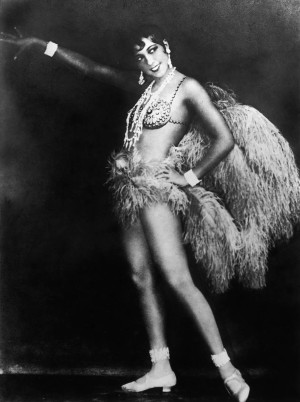Josephine Baker (Freda Josephine McDonald)

Josephine Baker
Singer, entertainer. Easily the most successful Black woman of her time, Josephine was born Freda Carson into poverty in St. Louis, Missouri. Her ticket out was her comedic and dance abilities, which powered her rise to early American fame on Broadway. Tiring of performing in demeaning minstrel reviews, she jumped at the chance of a career in Paris where the Jazz Age fueled heady interest in the then sensual and exotic African-American culture. Helping to bring the Charleston to Paris, Josephine became one of the most popular entertainers in Europe where her uninhibited performance style and accompanying lack of significant clothing to her costumes received greater appreciation than back in staid and divided America. Her contemporaries of the time all came under the spell of “La Baker,” including Hemingway, cummings, Gertrude Stein and Picasso. Somewhat ahead of her time, Josephine believed her fame in France would translate not only to a triumphant return to the United States but also that celebrated entertainers and pop culture could influence deep seeded tensions back home for the better. Despite top billing in the Ziegfeld Follies with Fanny Brice and Bob Hope, Josephine ran straight into racism time and again. She was barred from using public rooms at her hotels and, most famously, was refused service at the legendary Stork Club in New York City. She fought back, refusing to perform in clubs that did not allow integrated seating, most notably in Miami, Atlanta and Las Vegas, and ultimately renouncing her American for French citizenship in 1937. Things got nasty for Josephine when she came under federal investigation for communist activities during the McCarthy witch hunts of the 1950s, allegations which were never substantiated. Undaunted, she was one of many celebrity speakers at the March on Washington for civil rights in August, 1963. Her fights not only involved civil rights. Ms. Baker became a highly decorated veteran of the Second World War for service to the French Resistance against Nazi Germany. Using her celebrity as a cover, she carried sensitive documents to neutral countries and allied strongholds, sometimes using invisible ink on sheet music, and performed for allied soldiers in North Africa despite recovering from an extended illness herself. Extending her wish for civil harmony into her private life, Ms. Baker adopted 12 children of various ethnicities, who came to be known as her “Rainbow Tribe.” A declining career combined with a growing family overstressed her health and her finances, including a heart attack in 1964 and the humiliating eviction from her home in the south of France in 1969. Ever the fighter, Josephine Baker mounted one more comeback to great acclaim in 1975. Though not her last words, her famous response to one 15 minute ovation was “Now I can die.” Quietly, in her sleep, she did. The first American woman to receive full French military honors at her funeral, Josephine Baker locked up the streets of Paris one last time before being laid to rest in Monaco.
Born
- June, 03, 1906
- St. Louis, Missouri
Died
- April, 12, 1975
- Paris
Cause of Death
- Cerebral hemorrhage
Cemetery
- Cimetiére de Monaco
- Monaco, Monaco


